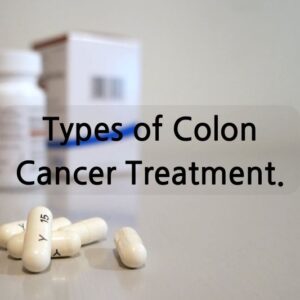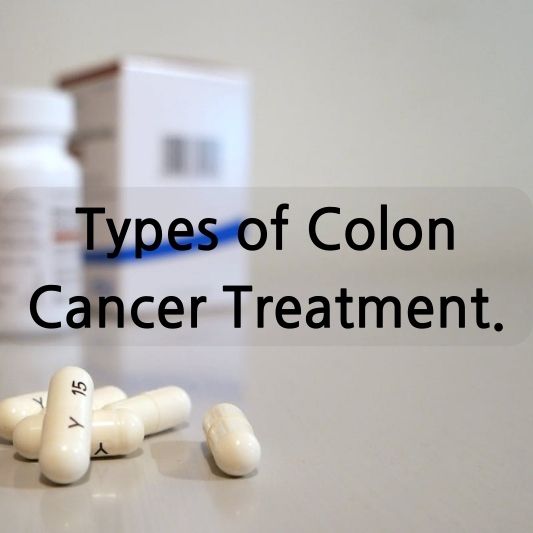Colon cancer is a prevalent form of cancer that affects the large intestine or colon. It develops when abnormal cells within the colon grow uncontrollably, forming tumors. Understanding the types of colon cancer and available treatment options is crucial for patients and their families.

Understanding the Types of Colon Cancer
Adenocarcinomas
Adenocarcinomas are the most common type of colon cancer, accounting for approximately 95% of cases. These cancers originate in the glandular cells lining the inner surface of the colon and rectum.
Carcinoid Tumors
Carcinoid tumors are rare neuroendocrine tumors that can develop in the gastrointestinal tract, including the colon. While they are generally slow-growing, they can spread to other parts of the body.
Gastrointestinal Stromal Tumors (GISTs)
Gastrointestinal stromal tumors (GISTs) are rare tumors that can develop anywhere along the digestive tract, including the colon. They originate from specialized cells within the wall of the gastrointestinal tract called interstitial cells of Cajal.
Lymphomas
Lymphomas are cancers that originate in the lymphatic system but can sometimes involve the gastrointestinal tract, including the colon. Lymphomas affecting the colon are relatively rare compared to other types of colon cancer.
Colon Cancer Treatment Options
Surgery
Surgery is the primary treatment for early-stage colon cancer. It involves removing the tumor and surrounding healthy tissue. In some cases, a procedure called a colectomy may be necessary to remove a portion of the colon.
Chemotherapy
Chemotherapy uses drugs to destroy cancer cells or stop them from growing. It is often used in combination with surgery to treat colon cancer, particularly when the cancer has spread to other parts of the body.
Radiation Therapy
Radiation therapy uses high-energy radiation to target and destroy cancer cells. It may be used before surgery to shrink tumors or after surgery to kill any remaining cancer cells.
Targeted Drug Therapy
Targeted drug therapy targets specific molecules involved in cancer cell growth and survival. These drugs may be used alone or in combination with other treatments to treat advanced or metastatic colon cancer.
Personalized Treatment Approaches
Genetic Testing
Genetic testing can help identify specific genetic mutations that may influence treatment decisions. It allows healthcare providers to tailor treatment plans based on the individual characteristics of the tumor.
Immunotherapy
Immunotherapy works by stimulating the body’s immune system to recognize and attack cancer cells. It has shown promising results in the treatment of certain types of colon cancer, particularly those with specific genetic mutations.
Supportive Care during Treatment
Managing Side Effects
Treatment for colon cancer can cause various side effects, including fatigue, nausea, and loss of appetite. Supportive care measures such as medications and lifestyle changes can help manage these side effects and improve quality of life during treatment.
Nutritional Support
Maintaining a healthy diet is essential for patients undergoing treatment for colon cancer. Nutritional support from dietitians and healthcare providers can help ensure patients receive the nutrients they need to support their overall health and well-being.
Clinical Trials and Emerging Treatments
Clinical trials play a critical role in advancing the understanding and treatment of colon cancer. Participating in clinical trials can provide access to cutting-edge treatments and therapies that may not be available through standard care.
Lifestyle Changes and Prevention Strategies
Diet and Exercise
Adopting a healthy lifestyle that includes a balanced diet and regular exercise can help reduce the risk of developing colon cancer. Consuming a diet rich in fruits, vegetables, and whole grains while limiting processed foods and red meat is recommended.
Regular Screening
Regular screening for colon cancer can help detect the disease early when it is most treatable. Screening tests such as colonoscopies and fecal occult blood tests are recommended for individuals at average risk starting at age 45.
Conclusion
In conclusion, understanding the types of colon cancer and available treatment options is essential for patients and healthcare providers alike. With advances in personalized medicine and supportive care, there is hope for improved outcomes and quality of life for individuals affected by this disease.
FAQs
What are the risk factors for colon cancer?
Risk factors for colon cancer include age, family history of colon cancer or polyps, personal history of colorectal cancer or polyps, inflammatory bowel disease (such as Crohn’s disease or ulcerative colitis), a diet high in red or processed meats, obesity, smoking, heavy alcohol use, and sedentary lifestyle.
How often should I undergo screening for colon cancer?
Screening recommendations vary depending on individual risk factors and guidelines from healthcare organizations. Generally, individuals at average risk should begin screening at age 45 and continue at regular intervals based on the screening method chosen (e.g., colonoscopy every 10 years, fecal occult blood test annually).
What are the side effects of chemotherapy and radiation therapy?
Side effects of chemotherapy and radiation therapy can vary depending on the type and dosage of treatment, as well as individual factors. Common side effects may include fatigue, nausea, vomiting, hair loss, changes in appetite, and increased risk of infection. Your healthcare team will monitor and manage these side effects to help minimize discomfort.
Is colon cancer hereditary?
In some cases, colon cancer can be hereditary, meaning it runs in families due to genetic mutations passed down from one generation to the next. People with a family history of colon cancer or certain genetic syndromes, such as Lynch syndrome or familial adenomatous polyposis (FAP), may have an increased risk of developing the disease.
How can I support a loved one undergoing treatment for colon cancer?
Supporting a loved one undergoing treatment for colon cancer involves offering emotional support, being present during appointments and treatments, helping with daily tasks and errands, providing nutritious meals, and offering a listening ear. It’s important to communicate openly and compassionately and to respect your loved one’s wishes and boundaries during this challenging time.
